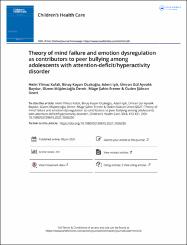| dc.contributor.author | Yılmaz Kafalı, Helin | |
| dc.contributor.author | Kayan Ocakoğlu, Binay | |
| dc.contributor.author | Işık, Adem | |
| dc.contributor.author | Ayvalık Baydur, Ümran Gül | |
| dc.contributor.author | Müjdecioğlu Demir, Gizem | |
| dc.contributor.author | Şahin Erener, Müge | |
| dc.contributor.author | Üneri, Özden Şükran | |
| dc.date.accessioned | 2023-07-29T12:47:18Z | |
| dc.date.available | 2023-07-29T12:47:18Z | |
| dc.date.issued | 2021 | en_US |
| dc.identifier.issn | 0273-9615 | |
| dc.identifier.issn | 1532-6888 | |
| dc.identifier.uri | https://hdl.handle.net/11363/5112 | |
| dc.description.abstract | This study investigated whether poor performance in the
Reading the Mind in the Eyes Test (RMET) and emotion dysregulation (ED) contributes to involvement in bullying among
adolescents with attention-deficit/hyperactivity disorder
(ADHD). Altogether, 105 adolescents with ADHD aged
10–18 years (mean: 13.9±1.8 years, 77% boys) were recruited.
RMET was applied to evaluate the ToM abilities. Participants
completed the Difficulties in Emotion Regulation Scale (DERS)
and the Olweus Bully/Victim Questionnaire to measure ED and
evaluate involvement in bullying, respectively. Among the subjects, 24.8% were victims, 23.8% were perpetrators. The perpetrators and victims exhibited significantly lower RMET scores
and higher DERS awareness scores than non-victims/nonperpetrators. The perpetrators also exhibited significantly
higher DERS impulse scores and DERS total scores than nonvictims/non-perpetrators. Binary logistic regression analysis
revealed that a 1-point decrease in the RMET score increased
the odds of bullying victimization by 53% and bullying perpetration by 21.6%, while a 1-point increase in DERS impulse
scores increased the risk of bullying perpetration by 14.9%.
This study is the first to show an association between poor
ToM ability and involvement in bullying as victims/perpetrators
among children with ADHD. Both victims and perpetrators had
problems with emotional awareness, while only perpetrators
had difficulties controlling their impulses. | en_US |
| dc.language.iso | eng | en_US |
| dc.publisher | ROUTLEDGE JOURNALS, TAYLOR & FRANCIS LTD, 2-4 PARK SQUARE, MILTON PARK, ABINGDON OX14 4RN, OXON, ENGLAND | en_US |
| dc.relation.isversionof | 10.1080/02739615.2021.1926250 | en_US |
| dc.rights | info:eu-repo/semantics/openAccess | en_US |
| dc.rights | Attribution-NonCommercial-NoDerivs 3.0 United States | * |
| dc.rights.uri | http://creativecommons.org/licenses/by-nc-nd/3.0/us/ | * |
| dc.subject | Attention-deficit /hyperactivity disorder | en_US |
| dc.subject | peer bullying | en_US |
| dc.subject | theory of mind | en_US |
| dc.subject | emotion dysregulation | en_US |
| dc.subject | adolescents | en_US |
| dc.title | Theory of mind failure and emotion dysregulation as contributors to peer bullying among adolescents with attention-deficit/hyperactivity disorder | en_US |
| dc.type | article | en_US |
| dc.relation.ispartof | Children's Health Care | en_US |
| dc.department | İktisadi İdari ve Sosyal Bilimler Fakültesi | en_US |
| dc.authorid | https://orcid.org/0000-0002-6009-1085 | en_US |
| dc.authorid | https://orcid.org/0000-0002-3116-4775 | en_US |
| dc.identifier.volume | 50 | en_US |
| dc.identifier.issue | 4 | en_US |
| dc.identifier.startpage | 413 | en_US |
| dc.identifier.endpage | 431 | en_US |
| dc.relation.publicationcategory | Makale - Uluslararası Hakemli Dergi - Kurum Öğretim Elemanı | en_US |
| dc.institutionauthor | Üneri, Özden Şükran | |



















